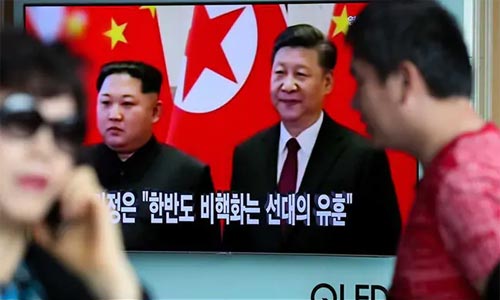The recent visit of Korean Leader Kim Jong-un to China to hold his fourth summit with Chinese President Xi Jinping signals a strong diplomatic tie between Beijing and Pyongyang. Kim’s three trips to China last year, before and after his summits with his South Korean and US counterparts, strengthened mutual relations between Democratic People’s Republic of Korea and China.
Kim’s this year’s visit to China carries much weight for three main reasons. For the one, Kim’s this year’s first overseas trip to China signals his commitment to continue his summit with Washington and Seoul for the denuclearization of Korean Peninsula, as he had stated in his New Year speech, and urge China to play its mediatory role. He also said he was willing to promote ties with the Republic of Korea and the United States and “sit down face-to-face” with Trump. Hence, Kim needs China to play its role in this regard, which has been proved highly fruitful so far.
Second, Kim and Xi had reportedly discussed the expected second US-North Korea summit, the first was held in Singapore in which Kim and Trump pledged to work towards denuclearization and establish a longer-term stable peace mechanism. But little headway was made with the vaguely-worded agreement signed between the two sides for denuclearization as both sides argue over its interpretation.
Washington’s package for Pyongyang is to be denuclearized once and for all. That is, US insists on CVID (complete, verifiable and irreversible denuclearization) which includes an end to uranium enrichment and reprocessing as well as ballistic missile and chemical and biological weapons. However, this “model of Libya” is not acceptable to Kim, who wants a gradual approach and demands US to lift its sanctions with each denuclearization move. In addition, “Kim is eager to remind the Trump administration that he does have diplomatic and economic options besides what Washington and Seoul can offer,” Harry J. Kazianis, Director of Defense Studies at the US-based Center for the National Interest, is cited as saying.
Third, Kim seeks to strengthen strategic and economic ties between his country and China. In his annual key note, Kim reiterated the importance of “strategic communication and cooperation” with socialist nations, highlighting his last year’s three visits to China. Subsequent to his conciliatory remarks last year, Kim broke the ice with DPRK’s neighboring countries and kept China in the loop. As Kim pledged to shift the country’s focus to economic development, China, which has championed reform and opening-up for four decades, will share its experience and the fruit of its economic reform with DPRK.
China is DPRK’s key diplomatic ally and main source of trade and aid. The two sides established diplomatic relations in 1949. A year later, North Korea’s then prime minister Kim Il-sung met chairman Mao Zedong. Since then, the mutual relations between China and DPRK passed many ups and downs. Marking 60 years of diplomatic relations between the two countries, North Korean’s then leader Kim Jong-il and his Chinese counterpart Hu Jintao exchanged greetings and declared 2009 as the “year of China-DPRK friendship”. The strained ties between the two sides were mended by Kim last year.
China has played a key role in resolving regional tension, including that of Korean Peninsula. As a result, US Secretary of State Mike Pompeo and ROK’s President Moon Jae-in praised Beijing’s role in denuclearizing the Korean Peninsula and resolving inter-Korean crisis. In his New Year press Conference, Moon said China played a constructive role in supporting the inter-Korean summits as well as US-DPRK’s summit.
The US-North Korean expected summit is highly significant and the negotiating sides have to hold meaningful talks so as to officially put an end to the Korean War and establish lasting peace and stability on the peninsula. It is believed that if Trump’s administration persists on CVID without considering DPRK’s demands, negotiations will be proved abortive. Lack of consensus will lead to horrible consequence as Kim warned in his speech that if the US misjudged Pyongyang’s patience, maintained sanctions and demanded denuclearization unilaterally, he might seek a new path.
As both DPRK and ROK leaders – who have confirmed their trust in Beijing and appreciated its role – are willing to reach consensus over the denuclearization of the peninsula and promote mutual ties, the two heavyweight actors, China and the US, are recommended to play their role more instrumentally so as to end the inter-Korean crisis this year.
Home » Opinion » The Outcome of Kim-Xi’s Visit
The Outcome of Kim-Xi’s Visit
| Hujjatullah Zia

